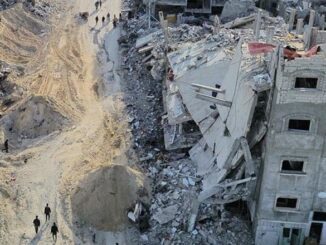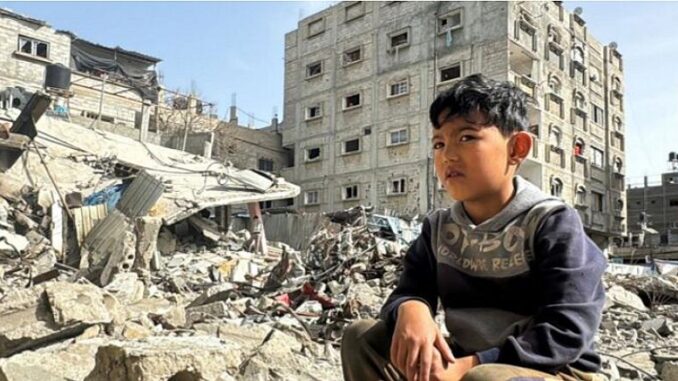
GAZA, April 26, 2024 (ENS) – Scorching temperatures across Gaza have magnified the daily suffering faced by the area’s displaced people and renewed fears of disease outbreaks due to a lack of clean water and waste disposal, United Nations humanitarians said on Thursday.
The warning from the UN agency for Palestinian refugees, UNRWA, comes as 1.2 million people continue to shelter in tents pitched in and around Gaza’s southernmost city, Rafah, with nowhere else to go.
With temperatures hovering around 40°Celsius (104°Fahrenheit), Rafah’s residents know that conditions will heat up even more as summer approaches, with temperatures set to reach “50℃ or 60℃,” (122°F or 140°F) said Mr. Radwan, who lives in a tent with eight family members.
Clean water remains scarce in Rafah and long queues are an everyday reality, Radwan continued. “Everything is a queue, everything is suffering in displacement.”
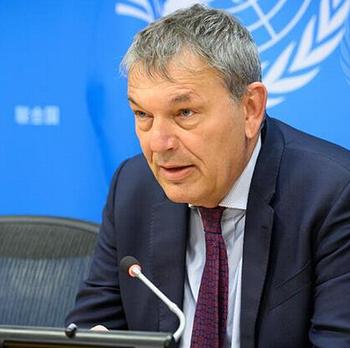
Since Hamas-led attacks in southern Israel in October 2023 that left 1,200 people dead and 250 taken hostage, Israeli military operations have killed more than 34,000 Palestinians in the Gaza Strip. UN and other humanitarian agencies continue to report long delays by Israeli authorities to allow lifesaving aid in at a scale that meets ever growing needs.
To make matters even worse, UN aid teams reported that no humanitarian missions were possible to northern Gaza on Wednesday “as the Israeli army closed its checkpoints on two roads due to troop movements.”
Still, the UN Office for the Coordination of Humanitarian Affairs, OCHA, noted that a joint UNRWA and UN Children’s Fund, UNICEF, mission did reach the city of Jabalia, located four kilometers (2.5 miles) north of Gaza City, on Tuesday, where they provided medical aid and water purification assistance.
- As of April 24, the total number of UNRWA colleagues killed since the beginning of hostilities is 180.
- At least 34,183 people have been killed and 77,084 have been wounded in Israeli attacks, according to the Gaza Ministry of Health.
- About 72 percent of those killed are women and children, according to an update by Gaza’s Government Media Office Tuesday.
- On Monday, United Nations human rights chief Volker Turk said a child in Gaza is killed or wounded “every 10 minutes.”
- Another 7,000 people are missing, according to the Government Media Office, many presumed dead under the rubble.
- As of April 24, up to 1.7 million people, over 75 percent of the population, have been displaced across the Gaza Strip, the majority moving multiple times in search of safety.
UNRWA reported successfully converting a children’s nursery into a functioning health facility in the Mawasi area of the devastated city of Khan Younis. Located north of the Rafah border crossing, Khan Younis is the largest city in southern Gaza, home to about 400,000 people before the current war began on October 7, 2023.
On Wednesday, UNRWA launched its updated occupied Palestinian territory flash appeal. As violence increases, UNRWA is seeking US$1.21 billion to address the unprecedented humanitarian crisis in the Gaza Strip and respond to needs in the West Bank.
UNRWA’s emergency appeal covers its humanitarian response until the end of 2024. It aims to respond to the most urgent needs of 1.7 million Palestinians in the Gaza Strip caught in the ongoing war, and more than 200,000 Palestine refugees in the West Bank, including East Jerusalem.
Hope: Nursery Pops Up as a Clinic
The demand for medical services is overwhelming, the agency said. The pop-up clinic receives around 2,000 individuals daily and offers services ranging from chronic disease care, maternal and child health care, dental services and psychological counselling.
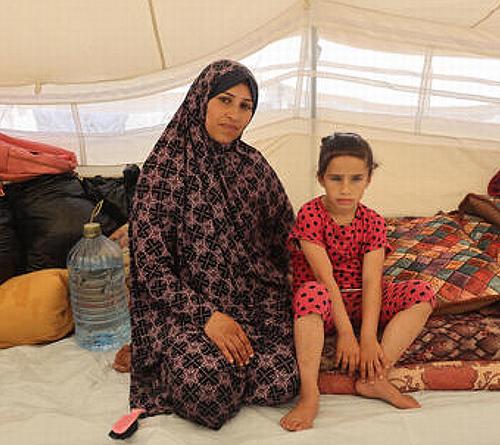
Asked about the rising temperatures in Gaza, he said, “Conditions are already atrocious. The whole system of treatment of solid waste has basically crumbled with the unimaginable sanitation impact that has on people’s health.”
“With the onset of summer, difficulties increase from water scarcity and overcrowding, leading to the spread of infectious diseases, skin sensitivities, lice, and other illnesses,” Dr. Ahmed Hanouda, the clinic’s director, said.
“We are, of course, trying to address these problems and provide services to the displaced people under these challenging circumstances based on the available resources. We look forward to offering better services and providing better facilities in the coming days,” he said.
Gaza Faces “Atrocious” Conditions
Asked at the regular UN daily briefing in New York about Israel’s plan, which remains on the table, to invade Rafah in its quest to eliminate Hamas militants, spokesperson Stéphane Dujarric said a ground operation would be “a humanitarian catastrophe.”
“We’re operating in a conflict zone…we will not be a party to any forced displacement of people,” Dujarric declared.
New Aid Effort on the Horizon
A new mechanism for getting lifesaving aid into Gaza will start in the coming days, UN Senior Humanitarian and Reconstruction Coordinator Sigrid Kaag of The Netherlands announced in a briefing to the Security Council on Wednesday.
“The operationalization of the mechanism will allow for pipeline prioritization, predictability, visibility and tracking of supplies to Gaza,” Kaag told ambassadors.
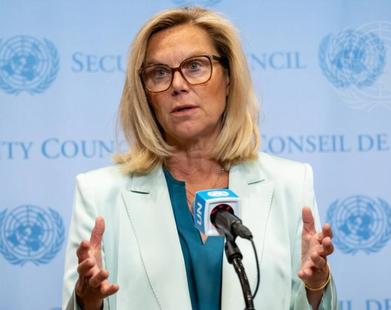
The new plan originated with Security Council resolution 2720, adopted in December 2023, which established Kaag’s position and requested her to forge a UN mechanism to accelerate aid deliveries into the war-torn enclave, which now faces widespread famine.
“As the resolution intended, the mechanism is designed to facilitate and support the work of all humanitarian partners on the ground,” Kaag said.
The mechanism will initially be applied to the Cyprus and Jordan aid routes, and technical consultations will soon be finalized with Egypt on its route, Kaag told the Security Council, adding that she has informed Israel about the operationalization of the mechanism.
“Verification and monitoring inside Gaza will commence as soon as possible,” she explained. “In the coming weeks, my office in Gaza will also be operational.”
In addition, a database and notification system will go online for all cargo destined for Gaza along supply routes, with the approval for placing international monitors at crossings, inspection and supply points having been requested from relevant authorities, she said.
Kaag underlined “the importance of a paradigm shift” to continue to meet the immense needs of the civilian population in a safe and secure manner.
That means a further scale up in the quality and quantity of assistance and distribution alongside irreversible steps to enable safe, secure and unhindered delivery inside Gaza as well as planning and timely preparations for early recovery and reconstruction.
“There is no substitute for political will to sustain these efforts,” she said, emphasising that aid agencies must be able to move food, medicine and other supplies safely and via all possible routes and crossings, into and throughout every part of Gaza.
“Effective humanitarian operations cannot be reduced to counting trucks,” she said. “This is a false metric for gauging whether humanitarian assistance is sufficient, let alone whether it responds to the basic humanitarian requirements.”
In this vein, she said the UN agency for Palestine refugees, UNRWA, is “irreplaceable and indispensable as a humanitarian lifeline and must be allowed to deliver on its mandate,” Kaag said.
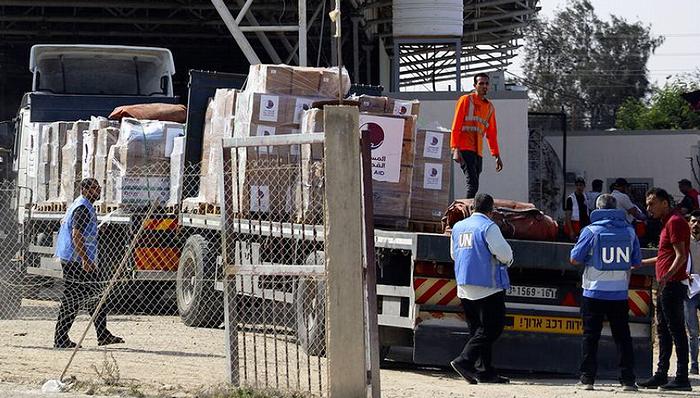
Israel Commits to Increasing Aid Deliveries
Israel has taken a number of steps to improve aid delivery since it made commitments on April 5 in response to requests by the United Nations and the international community, the UN Coordinator said.
That included an increase in the volume of aid cleared, inspected and crossed into Gaza, the temporary opening of the Erez crossing, and the opening of the Ashdod port for humanitarian goods as well as repairing the Nahal Oz water supply line.
“Whilst implementation of some measures is ongoing, further definitive and urgent steps are needed to set the course for a sustained flow of humanitarian and commercial goods into Gaza in terms of volume, need and reach,” Kaag said. “Given the scale and scope of destruction and the extent of human suffering every day counts.”
World Central Kitchen Demands Independent Commission
On Thursday, World Central Kitchen held an interfaith Celebration of Life at the National Cathedral in Washington, DC to honor its seven humanitarian aid workers killed on April 1 by Israeli fire while en route to deliver food aid in Gaza.
The memorial service honored Saifeddin Issam Ayad Abutaha of Palestine, John Chapman of Britain, Jacob Flickinger of the U.S. and Canada, Lalzawmi “Zomi” Frankcom of Australia, James Henderson of Britain, James Kirby of Britain, and Damian Soból of Poland.
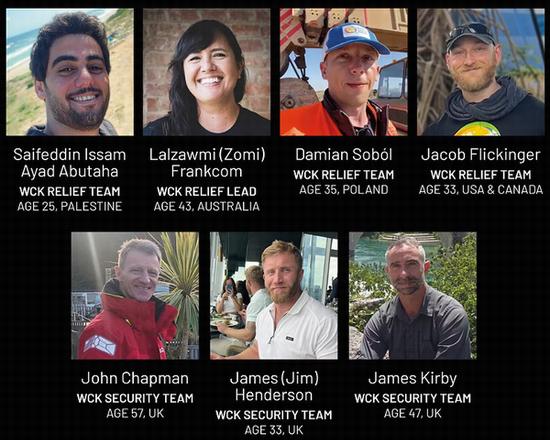
“The IDF [Israeli Defense Force] has acknowledged its responsibility and its fatal errors in the deadly attack on our convoy in Gaza. It is also taking disciplinary action against those in command and committed to other reforms. These are important steps forward,” said World Central Kitchen in a statement Thursday.
“However it is also clear from their preliminary investigation that the IDF has deployed deadly force without regard to its own protocols, chain of command and rules of engagement. The IDF has acknowledged that our teams followed all proper communications procedures. The IDF’s own video fails to show any cause to fire on our personnel convoy, which carried no weapons and posed no threat,” World Central Kitchen, WCK, said.
“Without systemic change, there will be more military failures, more apologies and more grieving families,” said WCK, a not-for-profit, non-governmental organization that provides food relief. Based in Washington, DC, the organization was founded in 2010 by Chef José Andrés.
“It’s not enough to simply try to avoid further humanitarian deaths, which have now approached close to 200,” said Chef Andrés. “All civilians need to be protected, and all innocent people in Gaza need to be fed and safe. And all hostages must be released.”
“The root cause of the unjustified rocket fire on our convoy is the severe lack of food in Gaza. Israel needs to dramatically increase the volume of food and medicine traveling by land if it is serious about supporting humanitarian aid,” WCK declared. “Food is a universal human right.”
Asserting that “the IDF cannot credibly investigate its own failure in Gaza,” WCK said, “We demand the creation of an independent commission to investigate the killings of our WCK colleagues.”
“Their apologies for the outrageous killing of our colleagues represent cold comfort,” WCK CEO Erin Gore lamented. “It’s cold comfort for the victims’ families and WCK’s global family. “Israel needs to take concrete steps to assure the safety of humanitarian aid workers. Our operations remain suspended.”
Featured image: Palestinian boy is surrounded by bombed out buildings, Rafah, Gaza. (Photo courtesy KhabarSahiHai)
© 2024, Environment News Service. All rights reserved. Content may be quoted only with proper attribution and a direct link to the original article. Full reproduction is prohibited.



